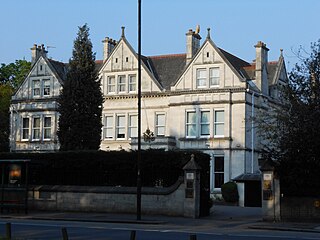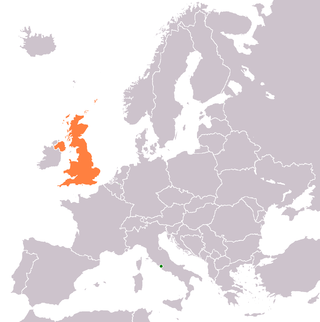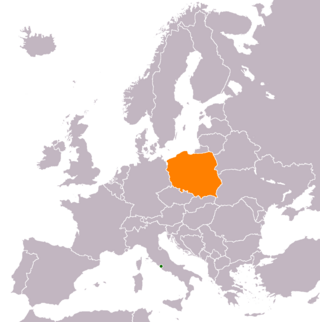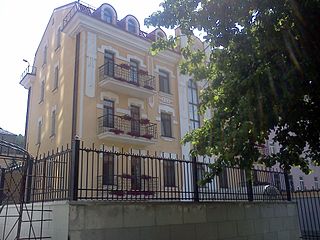
The Apostolic Nunciature to the United States, sometimes referred to as the Vatican Embassy, is the diplomatic mission of the Holy See to the United States. It is located at 3339 Massachusetts Avenue, Northwest, Washington, D.C., in the Embassy Row neighborhood. Since 2016, the papal nuncio has been Cardinal Christophe Pierre.

The Apostolic Nunciature to Great Britain is the diplomatic office of the Holy See in Great Britain. It is headed by the Apostolic Nuncio, who has the rank of an ambassador. The parties agreed to exchange representatives at the ambassadorial level and Pope John Paul II erected the Nunciature to Great Britain on 17 January 1982. Before then, the interests of the Holy See in Great Britain had been represented by an Apostolic Delegate since 1938, though not granted diplomatic status until 1979. The decision to designate the nuncio to Great Britain rather than the United Kingdom reflected the complex and frequently antagonistic relationship between the Holy See and the British crown since they severed ties in the sixteenth century. British government sources said it had been agreed that the nuncio in London would concern himself with matters in England, Scotland and Wales, while the Apostolic Nuncio to Ireland, based in Dublin, would have within his purview the entire island of Ireland.

The Apostolic Nunciature to Germany is an ecclesiastical office of the Roman Catholic Church in Germany. It is a diplomatic post of the Holy See, whose representative is called the Apostolic Nuncio to Germany with the rank of an ambassador. The office of the nunciature has been located in Berlin since 1925, in union with the new Apostolic Nuncio to Prussia until 1934. Between 1920 and 1925 the nunciature was held in personal union by the Apostolic Nuncio to Bavaria, seated in Munich. With the unconditional surrender of Germany in 1945 the diplomatic ties were interrupted and reestablished for West Germany only in 1951, then in Bonn. In 2001 the nunciature moved again to Berlin.

Relations between the Holy See and the Republic of China were established on a non-diplomatic level in 1922 and at a diplomatic level in 1942. The Holy See, under the One-China policy, recognizes the Republic of China as the representative of China.

Holy See–United Kingdom relations are foreign relations between the Holy See and the United Kingdom.
The Holy See has long been recognised as a subject of international law and as an active participant in international relations. One observer has stated that its interaction with the world has, in the period since World War II, been at its highest level ever. It is distinct from the city-state of the Vatican City, over which the Holy See has "full ownership, exclusive dominion, and sovereign authority and jurisdiction".

Vatican City and the State of Palestine established formal diplomatic relations in 2015 through the mutual signing of the Comprehensive Agreement between the Holy See and the State of Palestine. In 2017, a Palestinian embassy to the Holy See was opened.

Foreign relations between Argentina and the Holy See, have existed for over a century. The current pope, Pope Francis, was the former Archbishop of Buenos Aires.

India-Holy See relations are the bilateral relations between the India and Holy See, which is sovereign over the Vatican City. Formal bilateral relations between the two exist since 12 June 1948. An Apostolic Delegation existed from 1881. The Holy See has a nunciature in New Delhi while India has accredited its embassy in Vienna, Austria to the Holy See as well. India's Ambassador in Bern has traditionally been accredited to the Holy See. Since 2020, Jaideep Mazumdar, India's ambassador to Austria has been the ambassador to the Holy See. Archbishop Leopoldo Girelli was appointed as the Apostolic Nuncio to India in March 2021.

Holy See and Indonesia established diplomatic relations in 1950. Relations are important as part of global interfaith dialogue, because Indonesia has the world's largest Muslim-majority population. Indonesia recognizes Roman Catholicism as one of its six approved religions. The Holy See has a nunciature in Jakarta, while Indonesia has an embassy in Rome.

The Apostolic Nunciature to Israel is the nunciature of the Holy See to Israel. The head of the nunciature is the Apostolic Nuncio to Israel, who is the holder of a diplomatic position within the Holy See and acts as nuncio (ambassador) of the Holy See to Israel. The office's work takes place in the broader backdrop of Holy See–Israel relations that have evolved considerably since 1994.

Holy See–Poland relations are foreign relations between the Holy See and the Republic of Poland. As of 2015, approximately 92.9 percent of Poles belong to the Catholic Church.

The Apostolic Nunciature to Ukraine the diplomatic mission of the Holy See to Ukraine. It is located in Kyiv. The current Apostolic Nuncio is Archbishop Visvaldas Kulbokas, who was named to the position by Pope Francis on 15 June 2021.

Holy See–Philippines relations refers to the relations between the Holy See and the Philippines. As one of two Catholic-majority countries in Asia, the Philippines enjoys significant relations with the Holy See. The Holy See has a nunciature in Manila, and the Philippines has an embassy to the Holy See based in Rome.

Democratic Republic of the Congo–Holy See relations refers to the bilateral relations between the Democratic Republic of the Congo and the Holy See. The two states have seen an increase in their cooperation in recent years, and due to the large number of Roman Catholics in the DRC, President Joseph Kabila has made an effort to maintain good relations with the Vatican.

Central African Republic–Holy See relations refers to the current and historic relationship between the Central African Republic and the Holy See. Diplomatic relations between the two states were established in 1967, but only in recent years they have been increasing their cooperation, with high level visits being made by Pope Francis and President Faustin-Archange Touadéra to each other's countries.

Bulgaria–Holy See relations were formally established in 1990, shortly after the fall of the Bulgarian communist government. Since then, Bulgaria and the Holy See have had an increase in relations, with Pope John Paul II visiting the country in 2002, and more recently visits from Secretary of State Angelo Sodano (2005) and Pietro Parolin (2016).

Holy See–Ivory Coast relations refers to the current relationship between the Holy See and the Republic of Ivory Coast, which was established in 1970. A significant amount of Roman Catholics live in Ivory Coast, being nearly one-fifth of the population, and the two states are considered to have a cordial relationship.

Brazil–Holy See relations are the current and historical relations between Brazil and the Holy See. Catholicism was introduced in Brazil in 1500 by the Portuguese Empire, and it is the country's predominant faith. Brazil also has the world's largest Catholic population. Since the adoption of the Constitution in 1891, Brazil is a secular nation.




















